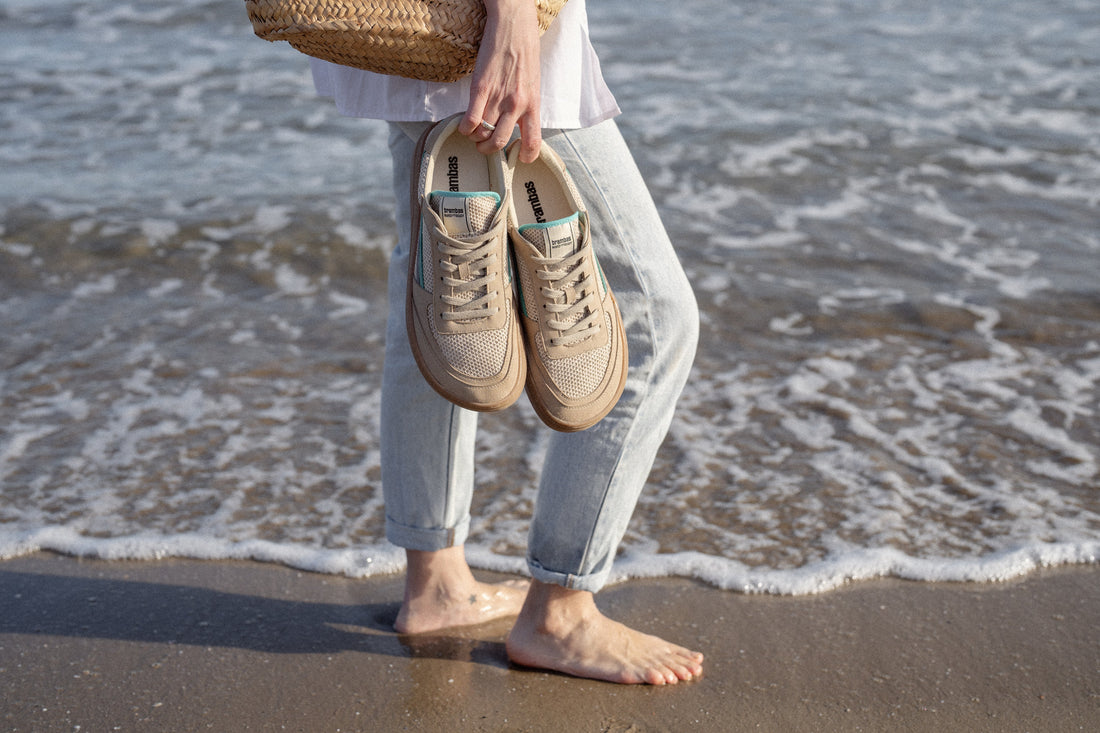
Grounding or Earthing: what is it and health benefits
Share
|
TABLE OF CONTENTS
|
We live surrounded by technology, asphalt and concrete. Our feet spend the day enclosed in rigid shoes, with hardly any real contact with the ground. In this context, more and more people are rediscovering an ancient practice with surprising effects: grounding, also known as Earthing.
This simple gesture: walking barefoot on earth, grass or sand, can have positive effects on our body and mind. At Brambas, we believe in going back to basics. That's why today we tell you everything you need to know about this connection with the earth.
What is grounding or earthing?
Grounding (or Earthing) is the practice of basically connecting with the earth, either by walking barefoot on natural surfaces or by touching them directly with your skin. The principle behind this practice is that the Earth has a constant negative electrical charge, and by being in contact with it, our body releases the excess accumulated positive charge.
This energetic balance is known as grounding or earthing, and is considered essential for the optimal functioning of the body. Although science is still investigating its effects, many people already integrate it into their daily routine because of the grounding benefits they feel.
Why do people talk about health benefits?
The Earth's surface acts as a huge natural electric field. By walking barefoot, we come into direct contact with that field, something that has been lost in our modern lives.
Preliminary studies have suggested that this grounding can have effects on the nervous system, sleep, pain and inflammation. While not a miracle cure, it is a simple and free tool to improve wellness.

Main benefits of grounding
Numerous testimonials and studies point to several positive effects. These are some of the most prominent:
Improved sleep
One of the most noted benefits of grounding is its impact on the quality of rest. By getting in contact with the Earth, our body can better regulate circadian rhythms, which translates into a deeper, more continuous and restful sleep.
Studies have observed that people who practice frequent grounding tend to sleep faster, with fewer interruptions, and wake up with a greater sense of restfulness. This improvement could be related to the reduction of stress and inflammation, factors that often disturb sleep.
Stress reduction
Modern lifestyles keep us constantly stimulated and disconnected from our natural surroundings. Walking barefoot in nature activates the parasympathetic nervous system, the one in charge of relaxation and recovery.
This can reduce cortisol levels, the stress hormone, and bring about an almost immediate sense of calm. Many people describe grounding as a form of active meditation: a simple practice that helps release tension and bring you back to the present moment.
Decreased inflammation
Chronic degradation is one of the main health problems in the world today, related to pain, premature aging and diseases such as arthritis or oxidative stress. Earthing allows the body to absorb free electrons from the earth's surface, which act as natural antioxidants.
These electrons help neutralize free radicals, which are responsible for cellular inflammation. Although research is ongoing, some clinical studies have observed reductions in inflammatory markers after several weeks of regular grounding practice.
Improved circulation
Barefoot walking is also good for activating the sole of the foot and improving blood flow. The direct stimulation of muscles, tendons and nerve endings when walking barefoot generates a beneficial effect on peripheral circulation .
In addition, by improving posture and gait pattern, grounding contributes to better distribution of body weight, which reduces stress on the joints and promotes more efficient circulation.
Improved balance and body awareness
Conventional shoes, with thick soles and narrow lasts, isolate us from our surroundings and reduce our ability to perceive the terrain. Barefoot walking or grounding activates proprioception, the body's ability to sense its position and move with precision.
This translates into better balance, agility and coordination, especially important for older people or those with injuries. In addition, reconnecting with your feet allows you to regain a more conscious relationship with your body and your environment.
Increases energy and reduces fatigue
Grounding can support better sleep, hormonal regulation, and improved circulation, all of which contribute to higher energy levels and reduced feelings of fatigue. Many people report feeling more energised and mentally alert after regular grounding practices.
How is grounding practiced in daily life?
Practicing grounding is easier than it sounds:
- Walk barefoot on grass, dirt or sand for at least 20-30 minutes a day.
- If you're in the city, seek out parks or natural areas.
- Touch trees or sit on natural ground without synthetic barriers.
- Make it part of your routine: after work, after waking up, or during a walk.

Barefoot shoes and grounding: is it possible?
We know you can't always go completely barefoot, especially in urban environments. That's why barefoot shoes bring you closer to the grounding experience without sacrificing protection.
Our barefoot shoes have:
- Thin, flexible soles that allow you to feel the ground.
- Wide lasts that respect the natural shape of the foot.
- Sustainable and vegan materials, which reinforce the connection with the environment.
Barefoot does not replace pure grounding, but it can be a valuable bridge to reconnect with the ground, especially in the city. It is a way to recover that forgotten sensitivity, to return to the origin step by step.
Conclusion: reconnect with nature, step by step.
Grounding is not a passing trend. It is a return to the essential: to the real contact with nature, to the pleasure of walking barefoot without filters. Whether completely barefoot or in barefoot shoes, each step is an opportunity to reconnect with yourself and with the Earth.
Barefoot is good. And if you can't, choose footwear that won't disconnect you. At Brambas, we accompany you on that path.




